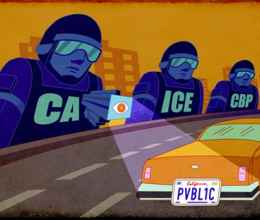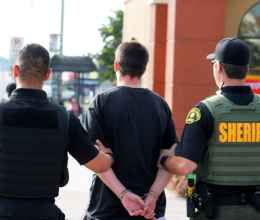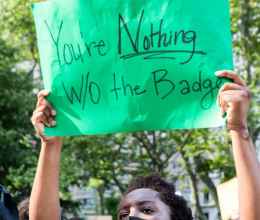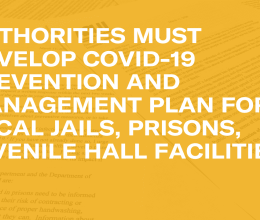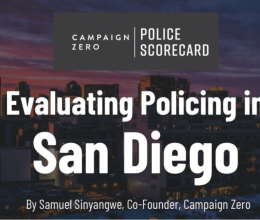Release of SDPD traffic stop data analysis as promised is imperative for police transparency, accountability and public trust, says San Diego ACLU.
SAN DIEGO, CA – In February 2015, the City of San Diego commissioned San Diego State University to analyze San Diego Police Department traffic stop data to shed light on possible racial profiling of local drivers. The SDSU report is scheduled to be presented and discussed at the City Council’s Public Safety and Livable Neighborhoods Committee meeting on October 26, 2016. The San Diego ACLU looks forward to reviewing this long-awaited study; to participating in a candid, constructive and evidence-based discussion of policing in San Diego; and to working with all stakeholders – affected community members, organizations, policy makers, and law enforcement – to bring about positive change for all concerned.
Serious concerns were raised that Mayor Faulconer might not release the SDSU report as promised. This was deeply troubling given the efforts to achieve transparency and accountability and build community trust with police. We just learned that SDSU’s preliminary findings will be reported to the PSLN Committee. The full report is promised in 30 days.
The time has come to hold Mayor Faulconer and San Diego Police Department accountable for a policy instituted more than 16 years ago to monitor for racial bias in police traffic stops. The time has come to hold them accountable for more than two years of broken promises to publicly disclose what the data reveals about racial profiling of San Diego drivers.
In accordance with the contractual agreement between the City and San Diego State University, the SDSU research report analyzing police traffic stops should now be in the Mayor’s possession. According to the agreement, it should be released to the Public Safety and Livable Neighborhoods Committee by October 26.
The Mayor’s office was initially vague about whether the report would be released as scheduled. Instead, we were advised that the City can take up to 90 additional days for review, clarification and preparation. According to the agreement, the 90 days is discretionary. But more than that, this report is two years overdue. Ninety more days will not change the number of black, Latino, Asian-American and/or white drivers pulled over in 2014 and 2015. Ninety more days only prolongs the lack of police transparency and accountability; and in the meantime, affected San Diegans continue to lose trust in the San Diego Police Department.
For several years, the City of San Diego has failed to properly hold SDPD accountable for compliance with their own policy for collecting and reporting race and ethnicity data related to traffic stops. Criminal justice experts agree such policies helps to monitor and prevent racial profiling, but SDPD did little to encourage officer compliance until October 2013. In January 2014, SDPD first promised public disclosure of the data analysis, but has yet to deliver. The preliminary report that is to be presented to the PSLN Committee on October 26 will be the first time the public will have fact-based analysis of police traffic stop data since 2002.
- In 2000, the San Diego Police Department instituted a policy requiring its officers to gather race and ethnicity information during traffic stops, making SDPD a national leader in using demographic data to address community concerns about racial profiling.
- In 2001 and 2002, SDPD partnered with academics to issue two annual reports analyzing the traffic stop data collected by the department. Those were the last published reports.
- In January 2014, we learned that SDPD had been ignoring its own policy at least 80% of the time, saying that San Diegans did not believe police racial profiling was a problem (a claim disputed by the local NAACP and several other community organizations, including the ACLU) – and also that no one asked for an analysis of the collected data.
- We learned also that SDPD would better enforce policy and improve data collection efforts. For the first time, SDPD made a public promise to be transparent and accountable for whatever the data showed.
- In May 2014, we learned that for the first three months of 2014, San Diego police stopped black and Latino drivers at a higher rate than their percentage of San Diego’s population. SDPD said the data was inconclusive that racial profiling was a problem.
- Eight months later, the SDPD presented its data for all of 2014. Again, we learned that San Diego police stopped black and Latino drivers at disproportionately higher rates. Again, SDPD said the findings were inconclusive that racial profiling was a problem.
- In February 2015, PSLN Chair Marti Emerald enlisted San Diego State University to conduct an independent analysis of 2014 traffic stop data to determine if people of color were disproportionately stopped by police while driving in San Diego. Funding was provided by the Mayor’s Office. The data analysis was due in October 2015.
- In October 2015, we learned that the SDSU report would be released in its entirety after community and police interviews were completed in June 2016.
- In June 2016, we learned that the SDSU report would be released in October 2016; specifically, that the full report would be presented at PSLN Committee meeting on October 26 and will include 2015 traffic stop data as well as the 2014 data.
- On October 10, we were advised by the Mayor’s office that the report was not in the City’s possession and reminded that the contract with SDSU allows the City up to 90 additional days for review, clarification, and to prepare for discussion of the findings.
-
On October 21, we learned that the Mayor’s office will release preliminary findings to the PSLN Committee on October 26 and a full report within 30 days.
-
###


